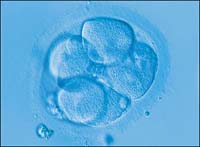Human-animal embryos to be used to extract stem cells in UK

By Alexandra Steblinina. Two proposals to research human-animal embryos, delivered from animal eggs, were approved by British regulators.
King's College London and Newcastle University were offered one-year research licenses, the Human Fertilization and Embryology Authority said.
The research will help developing techniques for producing human stem cells and maybe learn how to treat degenerative diseases like Parkinson's and motor neurone disease.
Scientists from King's College and Newcastle University introduced the way to get stem sells. They inject human DNA to animal eggs (from cows and from rabbits) and use electricity to make the cell divide. Soon the sell becomes an embryo and the stem cell can be produced from it.
Stem cells are cells found in all multi-cellular organisms. They retain the ability to renew themselves through mitotic cell division and can differentiate into a diverse range of specialized cell types. Research in the stem cell field grew out of findings by Canadian scientists Ernest A. McCulloch and James E. Till in the 1960s. The two broad types of mammalian stem cells are: embryonic stem cells that are found in blastocysts, and adult stem cells that are found in adult tissues. In a developing embryo, stem cells can differentiate into all of the specialized embryonic tissues. In adult organisms, stem cells and progenitor cells act as a repair system for the body, replenishing specialized cells, but also maintain the normal turnover of regenerative organs, such as blood, skin or intestinal tissues.
As stem cells can be grown and transformed into specialized cells with characteristics consistent with cells of various tissues such as muscles or nerves through cell culture, their use in medical therapies has been proposed. In particular, embryonic cell lines, autologous embryonic stem cells generated through therapeutic cloning, and highly plastic adult stem cells from the umbilical cord blood or bone marrow are touted as promising candidates
Subscribe to Pravda.Ru Telegram channel, Facebook, RSS!




